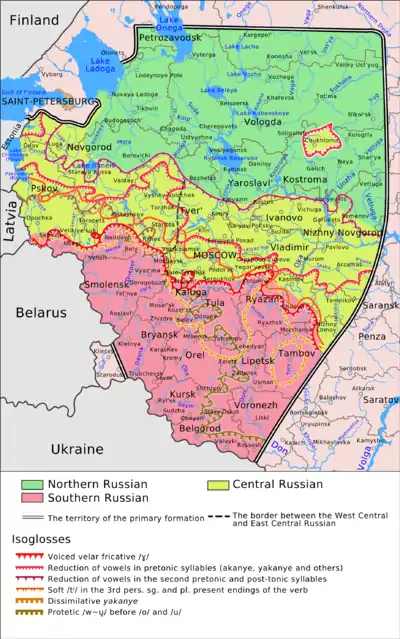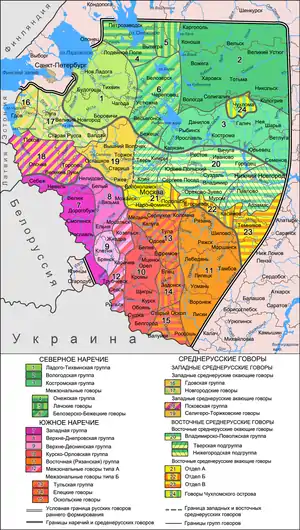Russian dialects
Russian dialects are spoken variants of the Russian language.

Depending on the presence or the absence of vowel reduction (akanye and/or ikanye) and the pronunciation of Proto-Slavic *g, Russian is divided into two main dialectical divisions and the intermediate one:
- Northern, in the northern and north-eastern parts of European Russia, from Veliky Novgorod to the Perm and northern Ural regions; this has no or little vowel reduction in unstressed positions and stop /ɡ/.
- Southern, in the western and southern parts of European Russia; this has various types of vowel reduction and fricative /ɣ/; this group makes up a dialect continuum with Belarusian, although it differs significantly from the Ukrainian dialects to the further south, sharing only a few isoglosses (namely the fricative pronunciation of Proto-Slavic *g).
- Central or Middle is in an intermediate position between the above two, stretching from Pskov to Tver, Moscow, Nizhny Novgorod, and down to the Lower Volga region; this group is very heterogeneous and consists of dialects both with and without vowel reduction and either /ɡ/ or /ɣ/. The Muscovite dialect forms the basis of Standard Russian: being originally a northern dialect, with /ɡ/ and no reduction, it later came under the southern influence and has adopted vowel reduction, but retained /ɡ/.
The dialects of the southern Ural, Siberia and the Far East may be of all three groups, depending on where the settlers from European Russia came from. The dialects of the Lower Don and the Northern Caucasus are of the Southern Russian origin.
Chronology and territory
All the Russian dialects are divided in two principal chronological and geographic groups:
- The dialects of the territory of the primary formation, which consist of "Old" Russia of the 16th century (before the Eastern conquests by Ivan the Terrible) and roughly correlate with the modern Central and Northwestern Federal districts.
- The dialects of the territory of the second formation, where Russians settled after the 16th century.
Classification

- Western
- Eastern
- Chukhloma enclave (with akanye)
Isoglosses
| Isogloss | Northern Russian | Standard Russian | Southern Russian |
|---|---|---|---|
| Unstressed /o/ | [o] | [ɐ~ə] | [a~ɐ~ə~ɨ] |
| Unstressed /e/, /a/, /o/ after palatalized consonants | [ɪ], [e] | [ɪ] | [æ] (pre-stressed), [ɪ] |
| /ɡ/ | [ɡ] | [ɡ] | [ɣ] |
| /v/ | [v] | [v] | [w~u̯] |
| /f/ | [f] | [f] | [x~xv~xw] |
| Present 3 p. sg. & pl. final | /t/ | /t/ | /tʲ/ |
| Final /l/[1] | /l/ | /l/ | /w~u/ |
| Past sg. masc. final | /v/[n 1] | /l/ | /l/ |
| Prothetic /v~w/ | no | no[n 2] | yes |
| Hardening of final soft labials | no | no | yes |
- Notes
- In the dialect of Vologda
- Except for восемь ('eight') and some other words
Other dialects
Eastern Europe
Belarusian Russian
Moldovan Russian
Moldovan Russian is characterised by differences in orthography, with the use of Молдова (Moldova) instead of Молдавия (Moldavia) in government and media of Moldova. This change is also widely accepted by Russian-language media inside of Russia, as well. Russian is more often used as a second language and as the language of interethnic communication than as a first language in the country,[2] which contributes to influence from the state language - Romanian.
Ukrainian Russian
- Odessan Russian
The Russian language as spoken in Odessa is influenced by Yiddish and Ukrainian in grammar, vocabulary, and phraseology. As a result, many phrases sound inherently and uniquely humorous to Russian speakers and constitute a staple of Odessa humour. Also, the Odessa dialect of Yiddish has plenty of Russianisms.[3][4]
Central Russian
Bashkort Russian
Bashkort Russian is characterised by the adoption of native Bashkir and Tatar words such as айда replacing давай to mean "let's go". [5]
Lake Peipus
Lake Peipus dialect (Russian: Причудский говор) is a Russian language variety spoken on both sides of the Lake Peipus in Pskov Oblast, Russia and some counties of Estonia. It originated as a mix of Pskov and Gdov dialects of the Central Russian cluster. As many other dialects from this area, it is often considered to be transitional between Russian and Belarusian. Lake Peipus dialects also include some loanwords from the Estonian language.
The dialect has been studied and described by Olga Rovnova of the University of Tartu who has conducted fieldwork in Russian Old Believers' communities in Estonia.
Caucasus
Abkhaz Russian
Abkhaz Russian is characterised by the use of Abkhaz terms, orthographical differences, and patterns of speech that diverge from that of Standard Russian.
Chechen Russian
Dagestani Russian
Dagestani Russian (Russian: Дагестанский русский) is a regional variety of the Russian language spoken in Dagestan, a constituent republic of the Russian Federation, and some of the neighboring regions including Astrakhan Oblast and Kalmykia. It is characterized by heavy influence from vernacular languages, mostly those belonging to the Northeast Caucasian and Turkic language families. It is considered a low prestige language and mostly used in informal domains. By some measures, it is considered an ethnolect.
Central Asia
Kazakhstani Russian
Most key word differences come in the form of toponyms of renamed cities after the 1991 independence of Kazakhstan. Not all renamings are manifested in the Russian language, such as with the city of Almaty, still known by its former name of Alma-Ata in Russian, because they sound similar. Other differences include names for authorities such as мажилис, мажилисмен which substitute the Russian word депутат. Акимат is a localised Russian construction of the borrowed word Аким, meaning mayor, and given the traditional -ат suffix in standard Russian that is used for words such as секретариат and ректорат. Kazakhstani Russian is often classified as being influenced strongly by Kazakh and the use of Kazakh words.[6]
Kyrgyzstani Russian
Kyrgyzstani Russian is primarily characterised by orthographic differences. Киргизская Республика (Kirgiz Republic) and Киргизия (Kirgizia) are the standard Russian names, but the country is called Кыргызская Республика (Kyrgyz Republic) or Кыргызстан (Kyrgyzstan) in Russian by the local authorities. The difference between ы and и in naming is classified as a linguistics dispute and is not currently compulsory for Russian-language media to use.[7][8]
There are also word differences, such as сотка (sotka) replacing the standard мобильник (mobil'nik).[9]
Vocabulary
Russian dialects usually preserve many archaic words and forms which dropped out of use or were replaced with Church Slavonic counterparts. In North Russian there are about 200 words of Uralic origin.
See also
- Ninilchik Russian, an isolated dialect of Russian spoken in Alaska.
References
- Sussex, Roland; Cubberley, Paul (2006). "Dialects of Russian". The Slavic languages. Cambridge: Cambridge University Press. pp. 521–526. ISBN 978-0-521-22315-7.CS1 maint: ref=harv (link)
- Dialects of the Russian Language
- Statistica MD. Statistics Office of Moldova http://www.statistica.md/public/files/publicatii_electronice/Recensamint/recensamint_2004_vol.I.zip. Retrieved 9 March 2019. Missing or empty
|title=(help) - Robert A. Rothstein, "How It Was Sung in Odessa: At the Intersection of Russian and Yiddish Folk Culture", Slavic Review, vol. 60, no. 4 (2001), pp. 781-801 doi:10.2307/2697495
- Grenoble, Lenore. "The Sociolinguistics of Variation in Odessan Russian" (PDF). University of Chicago. University of Chicago. Retrieved 9 March 2019.
- "айда". Wiktionary. Wiktionary. Retrieved 7 March 2019.
- ЖУРАВЛЕВА, Е. "РУССКИЙ ЯЗЫК В КАЗАХСТАНЕ: СТАТУС, СФЕРЫ ИСПОЛЬЗОВАНИЯ И ОСОБЕННОСТИ ЛЕКСИЧЕСКОЙ СИСТЕМЫ". UAPryal. УАПРЯЛ. Retrieved 7 March 2019.
- Киргизский бизнесмен оскорблен правилами орфографии // РИА «Новости». — 2003. — 13 августа.
- Распоряжение Администрации Президента Российской Федерации от 17 августа 1995 г. № 1495 «О написании названий государств – бывших республик СССР и их столиц»
- "Словарь "Языки русских городов"". ABBYY Lingvo. ABBYY. Retrieved 7 March 2019.
Text corpora of Russian dialects
- Ustja River Basin Corpus
- Corpus of Rogovatka dialect
- Corpus of Spiridonova Buda dialect
- Corpus of Malinino dialect
- Opochka Dialect Corpus